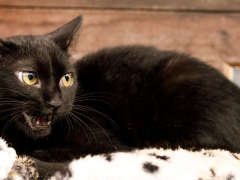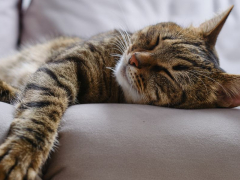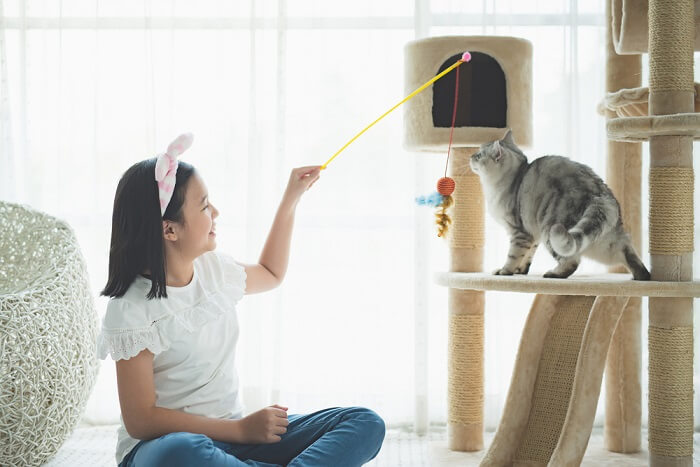
yiamXstoneman / Shutterstock.com
Kittens are charming creatures with fluffy coats, big eyes, and soft meows. However, their sharp teeth and claws can cause injury.
Kitten biting is a natural behavior during teething, playtime, and exploration. However, fear and pain can also trigger biting. Therefore, it is essential to determine the cause of the behavior and address it before the kitten grows up.
This article explains how to stop your kitten from biting. Learn how to gently discourage this frustrating behavior and build a lasting bond with your feline companion.
Why Is My Kitten Biting Me?
Biting is an instinctive behavior that felines exhibit. Kittens use their mouths and paws to bite objects and explore their surroundings. After all, they are born predators hardwired to attack and kill their prey. It’s essential to teach them appropriate biting etiquette from the day they are adopted.
Here are the main reasons why a kitten may mouth at you:
Early Learning Experiences
Kittens usually learn bite inhibition from the queen or through interactions with their littermates. Their dam or siblings reprimand a kitten that nips too hard. Early on, through social interactions and play-biting, kittens learn that hard gnawing may be painful, and their biting behavior is modified accordingly. Kittens who don’t learn this vital lesson are more disposed to bite inappropriately.
Teething
Kittens lose their baby teeth and grow adult teeth just like human infants do. This tumultuous period can bring about changes in your kitten’s behavior. Teething starts at about three and a half to four months and lasts until they are around seven months, during which time the baby teeth fall out, and adult teeth start to come through.
Kitten teething can be uncomfortable and painful, leading to increased gnawing and chewing. Monitor your kitten’s health, provide suitable toys for chewing, and keep hazardous items (e.g. electrical cords) out of reach.
Nursing Reflexes
Kittens have a natural suckling reflex, which they use to breastfeed. This reflex is present from birth and usually disappears by the third week of their lives or when fully weaned. However, if a kitten is orphaned or weaned too early, their nursing instincts of suckling and biting can transfer over to other objects such as human armpits or blankets, and can continue for several months.
It’s important to note that suckling and light bites can signify affection. The staff at the shelter removed our recently adopted kitten from her mother at two weeks old, so she still exhibits these behaviors at six months.
Play Aggression and Exploratory Behavior
Kittens are highly energetic and playful creatures who spend their first few months engaging in object and social play. At the end of the second month, behaviors such as pouncing, batting, and mouthing—all predatory behaviors—start to emerge.
Play helps kittens discover their surroundings, develop their hunting abilities, and understand social interactions. When your kitten doesn’t get sufficient playtime, it may resort to attention-seeking behavior and play aggression by stalking humans and pouncing on your hands and feet.
Overstimulation
You might be surprised that kittens and cats can be bitey when overstimulated. A sensory overload from a noisy environment or an excessive play session can result in an unexpected bite. Stroking a kitten too long or on unfavorable body parts can cause petting-induced kitten aggression, leading to a seemingly unprovoked attack.
Poor Socialization
During socialization, kittens learn how to behave and interact with their littermates, other pets, and people. Kittens who do not have littermates tend to take longer to learn social skills than those who do.
Solitary kittens do not learn bite inhibition during agonistic play, primarily if they target human hands instead of their siblings. It is difficult for a person to teach a kitten the boundaries of appropriate physical power as another kitten can.
Fearful Responses and Illnesses
When a kitten feels scared or threatened, they may bite to protect themself. For example, a kitten not used to being around people is suddenly confronted with a situation that makes them feel terrified, such as an unfamiliar person entering the home.
In response to this fear, while the owner holds the kitten, he may bite its caregiver to escape and find a hiding place, which happened in my instance with my recently adopted semi-feral kitten.
Kittens are vulnerable to various health issues such as fading kitten syndrome, parasites, upper respiratory infections, viral infections, and digestive problems. Due to these health problems, they may bite out of pain and discomfort. Therefore, it is crucial to keep a close eye on your kitten’s behavior and seek immediate veterinary medical care if needed.
8 Tips to Stop Your Kitten From Biting

Always redirect play biting to suitable toys. Joseph Jacobs / Shutterstock.com
Between three months and one year of age, kittens often display behaviors such as teething, rough play, and scratching. Teaching your kitten not to scrape or nip before it becomes an adult is essential.
Here are 8 tips to discourage biting.
1. Redirect the Behavior
Encourage your kitten to play with toys that allow them to mimic their natural hunting instincts. These toys should enable them to engage in stalking, chasing, pouncing, and catching their prey. Some great examples of these toys include feathers, toy mice, ping-pong balls, and wine corks. You can also attach toys to scratching posts to encourage your kitten to scratch appropriately.
Toss toys away from your body to encourage your kitten to chase and pounce on the toy instead of your arm. Although it may seem amusing to let a small kitten pounce on your toes, it won’t seem nearly as fun when they are fully grown, so never use your feet or hands to play with a kitten.
2. Discourage the Behavior
If your kitten behaves aggressively and bites or scratches you a lot, teach them it’s not ok by stopping interaction immediately and leaving the room. Ignore your kitten entirely for ten minutes until they settle down, teaching them that undesirable behavior leads to being disregarded.
Tell your kitten how you feel about gnawing; say a sharp ‘no’ or ‘ouch’ firmly or yelp in pain and withdraw your attention to discourage the behavior.
3. Offer Dental Chews or Toys
When your kitten is teething, they want to bite excessively. This is normal and thankfully temporary. To help them through this phase, you can offer them kitten-safe dental chews or chew toys. Alternatively, you can use Silvervine/Matatabi dental sticks, which are 100% natural. These sticks have a euphoric effect on cats. You can introduce them from about six months of age. Most kittens will rub their face on it, chew, lick it, or even bunny-kick it.
4. Teach Kittens Appropriate Play

Melina Grin / Cats.com
Ensure your kitten gets enough playtime. A good rule of thumb is to play twice daily for twenty minutes. Regular playtime can help reduce your kitten’s excess energy, create a closer bond and reduce the likelihood of play-biting.
During playtime, use a wand toy with feathers or strings on the top of the stick that your kitten can chase. This will keep your hands and feet out of reach and is a great way to encourage your kitten to play. Avoid petting or picking up your kitten during or immediately after playtime, as this might unintentionally encourage your kitten to think that your hands are toys. Instead, let them ‘win’ the toy at the end and calm down by chewing and gnawing at it until satisfied.
If you have a solo kitten or you’re having trouble keeping your kitten entertained due to long work hours, consider adopting a companion kitten that is well-bonded with your current one, which can also help your kitten learn how to play and prevent biting.
5. Provide Environmental Enrichment in a Calm Surrounding
To create a calming and stimulating environment for your cat:
- Provide them with safe hiding spots like carriers, tunnels, or boxes.
- Stick to a consistent feeding and playtime routine and avoid loud noises or sudden changes in the household. If you need to leave your kitten alone for long periods, keep them engaged in a self-directed way with puzzle feeders or food treasure hunts.
- Invest in cat trees, window hammocks, and scratchers to offer your feline friend opportunities to scratch, perch, and play while protecting your furniture from sharp claws.
6. Teach Gentle Handling Techniques
It’s essential to have a basic understanding of your kitten’s body language so you can figure out how they are feeling, when it’s a good time to interact with them, and when to leave them alone. Handle your kitten gently and frequently for short periods throughout the day. Over several weeks, introduce him to different types of people, including kids. Stop handling if the kitten appears uncomfortable or overwhelmed – too much exposure may lead to anxiety.
7. Encourage Socialization With People and Pets
Kittens, like puppies, need to be socialized and habituated to the world around them. To raise confident cats:
- Introduce kittens to new people and things while allowing them to approach or retreat on their own terms.
- Pair new experiences with positive things like treats or playtime.
- Gradually expose the kitten to sights, sounds, scents, and interactions with other pets, ensuring they remain relaxed and calm.
8. Use Positive Reinforcement Training
To successfully train your kitten, use toys or treats to reward them for positive behavior. One effective method is to use a fishing rod-style toy or a target stick to guide your kitten towards a mat. Once they reach the mat, you can allow them to play with the toy or reward them with a treat.
Clicker training is a great way to teach your kitten desired behaviors from a young age. Instead of repeatedly saying “no,” use positive reinforcement to guide your kitten towards more desirable behaviors. Additionally, if your kitten tends to grab food or treats with its paws, it’s best to use a spoon or popsicle stick to dispense them to avoid accidental bites or scratches, keeping your hands safe and free from harm during training.
What Not To Do When Your Kitten Bites

Never use your hands or feet to play with your kitten. Beachbird / Shutterstock.com
Never Punish Your Kitten
It’s important to avoid using punishment as it can lead to anxiety and fear in cats. Yelling, scolding, spraying water, or hitting a kitten when it nips can create negative experiences that cause fearfulness and potentially even more biting. Instead, focus on positive reinforcement and redirect your kitten’s behavior to teach desired actions.
Don’t Use Your Hands or Feet as Toys
Avoid tempting your kitten to play with a small toy in your hand. Your kitten may mistake your hand for a part of the toy and attack it even after you stop playing. Additionally, avoid poking or tickling your kitten’s tummy, wiggling your cat’s belly with your toes, or grabbing your kitten during playtime.
The kitten may associate your body parts with toys or games, which can lead to future issues. Instead, use homemade or store-bought interactive toys to play with your kitten to ensure a safe and enjoyable playtime.
Discourage Roughhousing
Avoid rough play or wrestling with your kitten, as these activities can cause overstimulation and defensive behavior, which may lead to cat aggression.
When To See a Behaviorist
If your kitten or young cat keeps attacking and biting your hands or ankles, don’t be ashamed to seek help. The occasional nip is normal when raising a kitten, but persistent painful biting is more of a challenge and may require professional input.
Continued biting behaviors could indicate your kitten is unwell, anxious, or uncomfortable in its new surroundings. Consult your veterinarian or an animal behaviorist for expert guidance.
Frequently Asked Questions
Do kittens grow out of biting?
Most kittens grow out of biting, clawing and suckling habits once they finish teething and become adults. Persistent biting behavior may indicate an underlying problem, so seek advice from a professional.
At what age do kittens stop biting?
No kitten is the same, so it’s hard to provide a definitive answer. Gnawing and nipping usually decrease once the kitten finishes teething at around 6-7 months. Many kittens will stop biting once they turn about a year old, while others may continue to exhibit play biting even as adults.
What age are kittens the naughtiest?
The naughty kitten phase typically lasts from two to eight months. Kittens are energetic and often enjoy pouncing and attacking anything that moves, including hands and feet. They also tend to chew through wires and run around in a frenzy called "zoomies". Despite these behaviors, kittenhood is a magical time; try to savor it.
-
Atkinson, T. (2018). Practical Feline Behaviour. Oxfordshire: CAB International. Retrieved March 15, 2024
-
Care, I. C. 2020. International Cat Care Advanced Feline Behaviour for Vet Professionals. (ICatCare, Compiler) UK. Retrieved March 10, 2024
-
Care, I. C. (2021). Caring for your new kitten. England, UK. Retrieved March 21, 2024
-
Feline Behavioral Health and Welfare - 1st Edition | Elsevier Shop. (2015, August 5).







